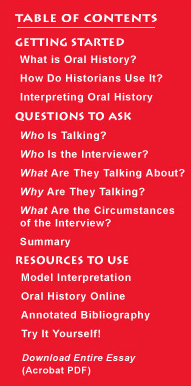
The circumstances
of an interview can also affect what is recalled. In general, interviews
for which both interviewer and interviewee have prepared are likely
to be fuller and more detailed accounts than more spontaneous exchanges.
Similarly, physical comfort and adequate time help create the expansive
mood and unhurried pace that enhances recall. I remember carving out
two hours from an otherwise busy day in which to conduct an interview
with a local civil rights activist. The narrator turned out to have
an exceptionally well-developed historical sense, answering questions
with not only great specificity but also considerable reflectiveness
on the larger significance of his actions. After two hours of talk,
I was becoming increasingly anxious about all the other things I had
to do that day. I was also becoming very hungry, as we had talked through
the lunch hour. As a result, the last part of the interview is rather
perfunctory. It would have been better if I had stopped the interview
after an hour and a half and scheduled a second session on another day.
Other external
conditions can also affect an interview. Some oral historians have suggested
that the location of the interview subtly influences what a narrator
talks about and how they talk about it. Interviews in a person's office,
for example, tend to be more formal, less intimate, with the narrator
emphasizing public rather than private life. Likewise, an interview
with more than one person simultaneously or the presence of a third
person in the room where an interview is taking place can constrain
a narrator, turning a private exchange into something more akin to a
public performance. I often think that interviews with two or more family
members at the same time document family relationships more than the
actual topics under discussion.




